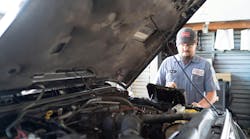Every day we see battle lines being drawn in D.C. But one thing is clear: the new Entry Level Driver Training (ELDT) ruling is here to stay.
As you've likely seen in the news this morning, the FMCSA requested a two-year extension for two parts of the ELDT plan — but intends for most of the rest of the program to go into effect on schedule. The two parts are:
- Uploading of CDL trainee completion data to the Training Provider Registry (TPR)
- Access to the TPR by State Driver Licensing Agencies (SDLAs) to confirm completion of the curriculum requirements set forth in the ruling
Will ELDT still go into effect next year? (Yes!)
First, it’s important to note that the ELDT law will still be going into effect as of February 7, 2020. Be sure to write that in red Sharpie pen on your calendar! If you are a training provider, you must:
Register and self-certify that your CDL training program meets all of the curriculum, facilities, and instructors requirements on the Training Provider Registry (which FMCSA is committing to make available by 2/7/2020).
As well as keep all test scores and completion records for all of your CDL trainee candidates as of 2/7/2020.
What does the delay affect?
The reason for the delay is technical. While FMCSA expects the TPR to be “stood up” in time for training providers to self-certify and register, the TPR is not expected to be able to upload driver-trainee completion data on the new ELDT curriculum. Nor is the TPR expected to be “hooked” into all 50 states’ IT networks to allow local DMVs to look up and confirm completion of the new, expanded curriculum requirements.
If you’re a training provider, this means you won’t be able to upload driver-trainees’ test scores and completion data into the TPR when ELDT takes effect. You’ll still need to keep track of this information, and local DMVs will still be required to verify that CDL candidates have gone through the new ELDT curriculum and passed at 80 percent or better.
According to FMCSA:
The proposed two-year extension would delay the date by which training providers must begin uploading driver-specific training certification information into the Training Provider Registry (TPR), an electronic database that will contain entry-level driver training (ELDT) information. It would also delay the date by which State Driver Licensing Agencies (SDLAs) must confirm [via the TPR] that applicants for a commercial driver’s license (CDL) have complied with ELDT requirements prior to taking a specified knowledge or skills test. [Note from ITI: We’re not sure how DMVs will verify completion, but if you use On Ramp, we’ll have all the records and can provide printed certificates if needed.]
FMCSA does not propose any other substantive changes to the requirements established by the ELDT final rule. This means that beginning February 7, 2020, training providers wishing to provide ELDT must be listed on the TPR and drivers seeking a CDL or endorsement on or after February 7, 2020, must complete the required training, as set forth in the ELDT final rule.
CVTA stresses the importance of looming implementation
"I want to be sure that all members understand that the FMCSA is not proposing a total delay of the regulation. All training providers will have to register and self-certify that they are teaching the ELDT curriculum and that they are ensuring that students graduating their programs are "proficient" (performance-based standard). Furthermore, training providers will have to document this performance through the use of assessments (theory and BTW)," said Don Lefeve of the Commercial Vehicle Training Association (CVTA) in an email to their membership.
Why only a partial delay?
Why bother with a partial delay? Why not just delay the whole rule?
Because both FMCSA and the industry value professional training standards. The discussion of whether professional drivers need professional training has been rhetorically asked for at least 20 years. The ELDT ruling represents a vastly higher quality and more comprehensive curriculum to help ensure professional truck drivers learn the essential skills and knowledge they need to perform on the job.
Therefore, and notwithstanding rebuke from a host of industry associations, CDL schools, private and for-hire fleets, suppliers, and public safety groups, FMCSA determined—rightly—that the ruling still stands and will go into effect in February 2020.
Start switching your curriculum today
One of the things we’ve heard from all the CDL schools is that they love the On Ramp online curriculum, testing, and record-keeping, but they’re waiting to see about the TPR. Well, there’s no reason to delay now. The curriculum isn’t going to change, and the only delay is the verification element of the TPR.
You need to get your instructors familiar with the curriculum and testing before February. So now’s the time before everyone rushes in at the last second.
Information provided by Instructional Technologies Inc.


